- Home
- Pauline Fisk
Mad Dog Moonlight
Mad Dog Moonlight Read online
For Jake
‘From high Plynlimmon’s shaggy side
Three streams in three directions glide;
To thousands at their mouths who tarry
Honey, gold and mead they carry.
Flow also from Plynlimmon high
Three streams of generosity;
The first, a noble stream indeed,
Like rills of Mona runs with mead;
The second bears from vineyards thick
Wine to the feeble and the sick;
The third, till time shall be no more,
Mingled with gold shall silver pour.’
Lewis Glyn Cothi
Contents
Mum’s Story
Part I – The Gap
1. Ryan Lewis
2. The Ffon
3. The Mermaid on the Beach
4. School
5. Swearing on the Book
6. The Storm
Part II – Devil’s Bridge
7. The Aged Relative
8. The Man with Red Tattoos
9. Up and Running
10. The Manager’s Ball
11. A Poisoned Chalice
12. Testing the Water
13. Aunty’s Promise
14. One River
Part III – Plynlimon
15. The End-of-Year Project
16. Up Plynlimon
17. Wilderness
18. A Monster on the Mountain
19. The Ingram Sisters
20. Answers for Elvis
Part IV – The Vasty Deep
21. Returning to Plynlimon
22. Dancers in the Dawn
23. White Porcelain Cups
24. Broken
25. Aunty’s Birthday
Part V – The Silver River
26. The Designated Campsite
27. It’s Time
28. Mad Dog, Mad Dog, Mad Dog
29. The Title Deeds of Plynlimon Mountain
30. Silver River
31. The Most Noble Form of Travelling
Also by Pauline Fisk for Bloomsbury
Mum’s Story
Winter came early the year that you were born – and I mean early. Usually we’d be off back down the Preseli Mountains before the first storms blew in, making the high roads impossible to navigate. But that year the last leaves had scarcely dropped off the trees before the bad weather rolled in.
The main roads were clear, but the back roads up round Snowdonia and Plynlimon, and all about the region that people in the old days used to call the ‘wilderness of Elynedd’, were like sheets of ice. And, as you know, the wheels of our old van aren’t that good at the best of times.
It was cold too. By God, it was cold. Usually it takes a whole winter to get through our supply of gas, but we were through the first two bottles already and only had one left.
I remember worrying about that. Lying in the van listening to your dad snoring and the wind howling outside as a snowstorm got up and flakes slid down the windows. All the blankets were piled on the bed but I was shivering. Usually a bit of bad weather doesn’t bother me. I’ll sleep through anything, me. It’s being born with travellers’ blood – that’s what I say. The blood of people who are used to putting up with things.
But, blood or no blood, that night I couldn’t sleep – and it was nothing to do with the weather. I was nearly nine months gone with you and, no matter how I lay, I couldn’t get comfortable. There wasn’t a bit of me that didn’t ache, but my back was worst. Our mattress was old and its springs were giving out. We were always saying we were going to look out for another, but we’d never found one.
Worse than the mattress, though, was the small matter of you. You never liked it when I rested, you little mad dog, you. The moment I put my feet up, you’d start having a go. What you wanted was me on my feet walking up and down, rocking your impatient little body inside of me. I used to reckon that even in my womb your travellers’ blood was driving you.
Anyhow, that night I got so fed up lying there being pummelled by you and snored at by your dad that I climbed out of bed, wrapped myself up in the nearest coat that I could find and went outside to stand in the snowstorm.
I’ve always liked doing that – not just watching the weather but feeling it going on all around me. Other people hide from it but I’ve always wanted to drink it up. There are songs to be heard in the dawn, you know, when the sun’s getting up and the sky is thin and clear. And colours in a storm – you can see them before it ever hits. Reds, blues and greens that people never notice because they never look. A storm should never surprise you, not if you use your eyes.
Least, that’s what I always used to think. But that night the storm surprised me, all right. It was ragged with snowflakes one minute, dancing at breakneck speed and churning up clouds like waves on a sea. Then, all of a sudden, it was gone. The moon blinked like an eye, opening and shutting, turning the landscape back and forth from silver to black as if a police car with flashing lights had arrived to move us on.
Then the clouds suddenly blew away like a carpet that had been rolled up. The wind dropped. The land stopped flashing on and off. The moon shone full. The stars were bright and between them all – I swear to God – A SILVER RIVER FLOWED THROUGH THE SKY.
I scarcely could believe it, and yet there it was. A real live river, made of silver, in the sky above our van! It snaked a path between the stars, and it was no Milky Way. No jet stream that I’d mistaken for something else, or strand of cloud lit up by the moon, or the Northern Lights or anything like that. It was a river of water flowing over my head, over the mountains and off through the night, and it was as real as anything I’ve ever seen. There were waves on it, and beaches on its shoreline, and pools that were still and deep, and other places where the water ran fast, bubbling and crashing in its hurry to get on.
At one and the same time it was just like any other river I’d ever seen, and yet as unlike any other river as anything could be. I remember calling for your dad, but he carried on snoring and didn’t hear. I was the only one who saw it. I held out my hands as if I wanted to take hold of it. I’d have given anything to leap into those shining waters and let them carry me away. But they were too far from me and, besides, I had you to think of.
No sooner had the merest idea of swimming lodged itself in my head, than you got my insides, you crafty little beast, and started tying them in knots. And I’m not just talking about kicking here. I’m not even talking about pummelling. I’m talking about going into labour.
From the first contraction onwards, you really went for it. The world was out there and you couldn’t wait to see it. Nothing timid about your birth, my lad. Nothing nervous, inching forward. From that first contraction onwards, I was in for a full-on assault.
Hardly surprisingly, I forgot about the silver river and rushed to shake your dad awake. For the next couple of hours, it was panic stations. The mountain passes were all choked with snow, but then I didn’t want to go to hospital anyway. I wanted you to be delivered on the open road the way that travelling people always used to do it. But, for all my forcing him to mug up on home deliveries, your dad had refused to hear of such a thing.
In the end, though, I had it my way. By the time your dad got the van even halfway down the mountain, the clouds had long-since come rolling back, full of snow, and the whole world was so white that he couldn’t see beyond the wipers on his windscreen. The van started sliding about all over the place, and your dad said we’d never make it to the hospital.
So we gave up trying there and then, and you were born in a lay-by, in a blizzard, on an empty mountain pass road with not another soul in sight for miles. Your dad acted as midwife and made a brilliant job of it. It’s amazing what that man can do when
he stops grumbling and gets on with it.
After the blizzard was all over, he wrapped you in a blanket and lifted you to the van window to see the world into which you’d been born. The mountains and valleys stood like white ghosts beneath an early-morning sky, but the river had long-gone as well, and all that remained of that unforgettable night was a pale moon growing paler by the moment as the sun broke over the mountains, setting the snowy landscape on fire.
It was a wonderful sight. So wonderful that your dad opened the van door and carried you out into it. But, instead of being impressed, you started howling. He thought it was the cold air, and rushed you back inside. But I knew you were crying because you’d come too late. It was as if the snowy landscape was the support band, and the silver river in the sky the main attraction, come to earth for a once-in-a-lifetime performance, and you had missed it and you knew.
You howled as if you’d never stop. Howled the way that mad dogs do at the moon. If you ever hear them out in the wilds, on a lonely night with not a soul around, you’ll know how chilling they can be. But, if a newborn baby’s doing it, to show that it’s alive, it’s awe-inspiring. Believe me.
And that’s the way you got your name. MAD DOG MOONLIGHT. It’s not some crazy name we came up with off the top of our heads. It’s the name you earned for yourself the day that you were born. It’s your name, and don’t you ever let anybody take it from you, because it’s who you are.
Part I
The Gap
1
Ryan Lewis
When Mad Dog arrived, one of the first things Aunty did was give him a new name. He tried explaining that he had one, thanks, and didn’t need another, but she insisted that he couldn’t go round being called after some dog.
Mad Dog couldn’t see why not. He sat on the edge of an enormous armchair in an unknown sitting room in a house he’d never seen before while an aunty – who was as unknown as everything else – told him that people would make fun of him if he went round telling them he was called Mad Dog Moonlight.
‘All right, I won’t say anything,’ Mad Dog said, as if the problem was easy to solve. ‘If they ask my name, I’ll say I don’t know.’
‘You’ve got to have a name,’ the aunty insisted. ‘Everybody has a name. People need to know what to call you. What’s your real name? You know, the name on your birth certificate – surely you know that?’
Mad Dog didn’t know what a birth certificate was any more than what this unknown aunty meant when she talked about real names. But he knew he wasn’t Ryan, which was what she decided to call him. Ryan with a Lewis at the end of it, chosen because it was her husband’s family name and, if it did for them, it could do for him.
It wasn’t exactly the best of starts. Until now, Mad Dog Moonlight had always felt invincible and brave, wolfish and wild, a free boy of the open road with not a care in the world. But with a name like Ryan Lewis he felt like someone’s pet, waiting for his owners to come and collect him.
The trouble, though, was that they didn’t. That first day Mad Dog refused to eat or talk or get off the big chair, but simply looked out of the window waiting for his parents. By bedtime they hadn’t come for him and the new-found aunty led him upstairs to a bedroom that she said was ‘his’. It had a cot in one corner, for his baby brother, a bed for him and lots of toys and picture books that she referred to as ‘yours while you’re here, so feel free to enjoy them’.
Mad Dog couldn’t work out what was going on. The bedroom was bigger than his parents’ entire van, and he felt lost in it. He lay awake half the night, listening out for them. But by morning they hadn’t come and, by the following night, they still hadn’t come. And, by the end of the first week, there was still no sign of them.
Other children passed through the aunty’s house, and they had parents who dropped them off and came back later. But no parents came for Mad Dog, and sometimes he’d tear around the house, yelling in the other children’s faces or throwing things at the aunty and, at other times, he’d sit in the big chair, refusing to talk or eat, simply saying over and over again, ‘I want to go home.’
Mad Dog hated this strange house. It didn’t shake like his parents’ van, but always stayed solid and in exactly the same place. Its walls didn’t rattle as if they were alive. Its floors didn’t roll with the motion of the road. Its windows always opened out on the same view.
Aunty said that Mad Dog was to look upon it as his home. ‘No. 3, The Gap, Aberystwyth Harbour,’ she said. ‘From now on, if anybody asks, it’s your address.’
But why was it his address? What had happened to his real home? One day he’d been his old, usual self, living his old, usual life with his mother and his dad and, the next, he’d been turned into someone called Ryan Lewis who lived with an uncle and aunty he’d never met before and a stream of children, who came and went, who he didn’t know and didn’t want to.
Aunty tried coaxing him to make friends but Mad Dog wouldn’t have it. What did he want friends for? All he wanted was his old life. And how could he make friends, anyway, with weird children like these who watched telly all the time and played with stupid toys, and never did any of the sorts of things he was used to doing, like building dams in streams, climbing trees and being taught by his dad to catch fish with his bare hands?
So Mad Dog ignored these other children when they came round, and took to spending most of his time upstairs at his bedroom window. He refused all Aunty’s attempts at mothering him, and the only person that he relaxed around was his baby brother, whom he’d jig up and down on his lap, promising that their parents would soon come for them.
Mad Dog’s brother’s name was Elvis – which was another thing that had set Aunty off when they’d first arrived. ‘Elvis Preseli,’ he’d said when Aunty asked. And she’d replied, ‘You must be joking!’
But Mad Dog wasn’t joking. Why would he do that? He tried explaining to Aunty about Elvis being named after a local saint who came from the Preseli Mountains in west Wales, where he’d been born. But Aunty insisted that the name Elvis was out. Again she said that people would laugh. She didn’t explain what was so funny but, after that, Mad Dog’s brother became Eric Lewis, just as he was Ryan Lewis.
Mad Dog didn’t want them to be Lewises, but he had no choice. Everybody in Aberystwyth, or so it seemed to him, was a Lewis. The family was everywhere. Right across that area of the harbour set behind the River Rheidol and known as ‘the Gap’, aunties, uncles, cousins, nieces, nephews, grandparents and grandchildren filled almost every house. Half the children who came to play were Lewises, and the other half were Williamses from Aunty’s side of the family. But most of the Williamses turned out to be married to Lewises anyway, so there wasn’t much to choose between them.
Not that it made any difference to Mad Dog. Williamses and Lewises counted for nothing as far as he was concerned. All that counted was the family he’d left behind, not the one that he was stuck with now. Aunty could go on for as long as she liked about him being ‘one of us’, but she and Uncle could have been anybody as far as he was concerned – not just Lewises or Williamses, but witches, robbers, big bad wolves. Or even school teachers.
In the old life that he’d left behind, Mad Dog had heard talk of a terrible place called school where his parents seemed to think he might end up if they weren’t careful. Mad Dog didn’t know what school was – only that it had apparently never done them any good and was best avoided.
For the first few days after arriving at No. 3, he lay awake at night, worrying that this house was school, and that Aunty and Uncle had kidnapped him and were going to do terrible things to him. Uncle was a brawny ex-seaman, six foot three in his socks, with muscles the size of hams and a head built like a battering ram. And Aunty might be short and skinny, but she didn’t look any less tough.
In the end, with still no parents coming to his rescue, Mad Dog decided that the best thing was to go and find them. He went at night when he thought everyone was asleep. Dressing quietly so as not
to wake his brother, he crept downstairs, opened the front door and headed off into the night. He didn’t have a clue where he was going but, at the end of the Gap, where the River Rheidol ran under the road bridge before flowing out into the harbour, it came to him that the world was a big place and perhaps he should wait until he’d grown up a bit.
Mad Dog was on the way back to No. 3, trying to work out which was the right house because they all looked much the same to him, when he bumped into Uncle coming after him. Uncle didn’t shout or anything like that, but it was obvious that he was rattled at having to come out in the middle of the night. When they got back indoors, Aunty was obviously rattled too – though she did manage a quick hug before telling Mad Dog off.
Even Elvis seemed to have caught the mood of general rattlement, looking up from his cot with an accusing face, as if he knew that Mad Dog had walked out on him. Mad Dog only had to look at him to feel ashamed.
After that, he tried to be a better brother and stop thinking about running away. Instead of burying himself in deep, dark thoughts, he tried to lighten up for Elvis, playing with him, helping at feeding time, rocking him when he had wind and even changing the odd nappy. Then at night-time in their room together, he lulled his brother to sleep with their parents’ stories. He told their dad’s favourite one about them having Trojan blood and being twice as brave as anybody else, his mother’s favourite one about the silver river, and a string of others about doing what she’d always called ‘trusting in the power of the open road’.
‘You’ll always be rovers,’ their mother had said. ‘One only has to look at you to see you’ve got travelling blood. You’re dark like a pair of secrets – dark like the earth itself. Fierce, and flint-hard, and you’ll always end up on the move. It’s your curse and calling, just like it’s mine. You’ll never settle down.’
Well, she was wrong about that one! Some nights, after he’d talked Elvis to sleep, Mad Dog would cry into his pillow. He refused to do it in front of Aunty because of what his dad had said about being brave. But the darkness was different. Here, if he dishonoured his Trojan blood, no one needed to know.

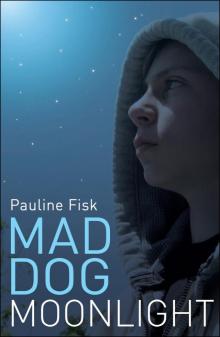 Mad Dog Moonlight
Mad Dog Moonlight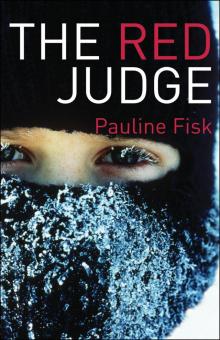 The Red Judge
The Red Judge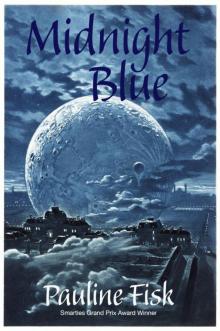 Midnight Blue
Midnight Blue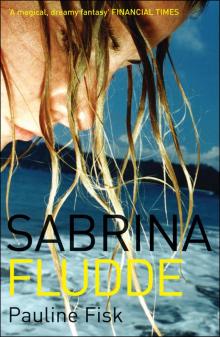 Sabrina Fludde
Sabrina Fludde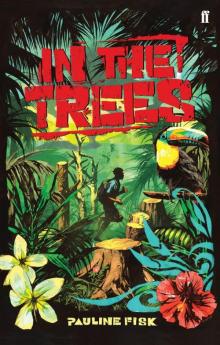 In the Trees
In the Trees